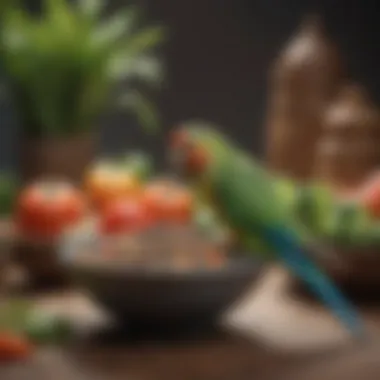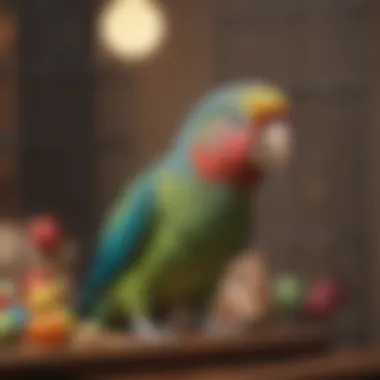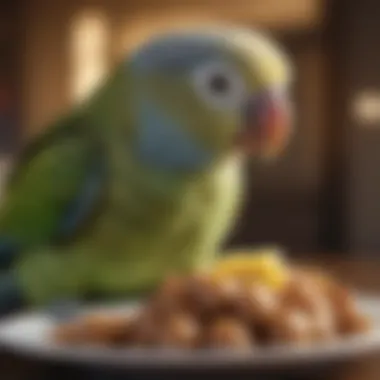Understanding Parakeet Formula: Essential Nutrition Insights


Intro
Parakeets are vibrant and intelligent birds, making them popular among pet owners. Understanding their needs is crucial for their well-being. A well-balanced diet, proper care, and engaging activities contribute to their health and happiness. This guide provides insights into the essentials for parakeet care, ensuring a long and fulfilling life for these birds.
Understanding Your Pet
Pet Behavior Basics
Parakeets exhibit a variety of behaviors that reveal their needs and emotions. They are social animals and thrive on interaction. Observing their body language helps in understanding their mood. For example, a parakeet that is puffed up may be feeling cold or unwell. Conversely, a bird that mimics speech or sings often is likely happy and healthy. Paying attention to these cues is vital for creating a nurturing environment.
Common Breed Characteristics
Different parakeet breeds possess unique traits. Budgerigars, commonly known as budgies, are one of the most popular breeds. They are small, colorful, and friendly. On the other hand, Monk parakeets are larger and known for their distinct nesting habits. Understanding these characteristics aids in meeting their specific needs.
Species-Specific Needs
Each species of parakeet has specific dietary and environmental requirements. For instance, some breeds prefer certain types of seeds or fresh fruits. Researching the characteristics of your parakeet's species can significantly enhance their care and overall quality of life.
Pet Care and Maintenance
Feeding Guidelines
A balanced diet is essential for the health of parakeets. Commercial parakeet formulas are widely available and often contain a mix of seeds, pellets, and dried fruits. However, supplementing their diet with fresh vegetables like carrots, leaf greens, and occasional fruits is crucial. Always ensure that fresh water is available.
Grooming Essentials
Grooming helps maintain a parakeet's well-being. Regular nail trimming prevents discomfort, while providing cuttlebone or mineral blocks helps keep their beaks healthy. Feather care is also important. Bathing should be encouraged, either through misting with water or providing a shallow dish for them to splash in.
Hygiene Practices
Cleanliness is vital in ensuring a healthy living environment for parakeets. Regularly clean the cage, removing waste and uneaten food. This helps prevent diseases. Additionally, replace bedding and wash food dishes frequently to maintain hygiene.
Training and Development
Basic Commands and Skills
Training your parakeet can be rewarding. Start with simple commands like
Foreword to Parakeet Formula
Understanding the parakeet formula is crucial for ensuring the well-being of these vibrant birds. This section dives into the critical aspects that make up a balanced diet, focusing on nutrition and its impact on overall health.
The Importance of Nutrition in Parakeets
Nutrition plays a pivotal role in a parakeet's life. A well-balanced diet supports their physical health, feather quality, and energy levels. Undernourished parakeets can face a plethora of problems, including weakened immune systems and short lifespan.
Apart from health, good nutrition also affects behavior. A lack of essential nutrients may lead to lethargy or aggressive behavior. Conversely, providing nutritious food helps stimulate activity and curiosity in these birds. Thus, attentive pet owners should invest their time and resources into understanding nutritional needs.
Overview of Parakeet Diet Needs
To keep parakeets healthy, knowing their dietary requirements is essential. Parakeets thrive on a mix of seeds, pellets, fresh fruits, and vegetables. Seeds provide energy, but they should not be the exclusive food source, as they lack vital nutrients.
Pellets, on the other hand, are more balanced and formulated to contain necessary vitamins and minerals. Fresh fruits and vegetables are equally important, adding fiber and hydration to their diet.
In summary, a diverse diet will ensure that parakeets receive all necessary nutrients. Regularly varying their menu can prevent boredom and encourage healthy eating habits.
Key takeaway: A mixed diet of seeds, pellets, and fresh produce keeps parakeets vibrant and healthy.


This article will delve deeper into each component of the parakeet formula, helping owners make informed decisions for their pet birds.
Components of a Healthy Parakeet Formula
A balanced and nutritious diet is vital for maintaining the health and well-being of parakeets. As we explore the components of a healthy parakeet formula, it is crucial to consider the different food sources available and how they contribute to the overall diet. This section will discuss the main ingredients included in a parakeet's diet, highlighting their benefits and the considerations pet owners should keep in mind when selecting nutritional options for their birds.
Seeds: The Staple Food Source
Seeds are often the primary component in a parakeet's diet. They provide essential fats and energy. Different types of seeds serve varied purposes, such as sunflower seeds, millet, and canary seeds. These seeds vary in their nutritional elements, thus offering a spectrum of benefits.
While seeds can be rich in fats, they must be offered in moderation to prevent obesity. Pet owners should aim for a mix of seeds to ensure variety and balance. This can help mimic a parakeet's natural foraging behavior, keeping them engaged and active.
It is beneficial to remember that not all seeds carry the same nutritional value. Therefore, choosing high-quality seed mixes designed for parakeets is critical. These mixes often include seeds that are fortified with vitamins and minerals necessary for their health.
Pellets: An Alternative to Seeds
Pellets are another significant dietary option for parakeets. They are formulated to contain balanced proportions of vitamins, minerals, and nutrients. This consistency makes pellets an attractive choice for pet owners concerned about meeting their parakeet’s dietary needs.
The use of pellets reduces the chances of selective feeding. Parakeets tend to pick out favorite seeds and ignore others, leading to nutritional imbalances. When fed pellets, birds receive a more uniform diet.
However, not all pellets are created equal. It's important to choose high-quality brands that avoid artificial colors and preservatives. Pay attention to expiration dates, as expired pellets can lose their nutritional value.
Fresh Vegetables and Fruits
Fresh vegetables and fruits are an essential part of a parakeet’s diet. They provide vital vitamins and hydration that seeds and pellets may lack. Common choices include broccoli, carrots, apples, and leafy greens. Introducing a variety of options encourages exploration and enjoyment of different flavors.
Fruits and vegetables need to be properly washed and cut into manageable pieces. To avoid digestive upset, introduce them gradually into the diet. Fresh produce should not make up more than 20-25% of the overall diet, ensuring a balance with seeds and pellets.
Important Note:
Not all fruits and vegetables are safe for parakeets. Foods like avocado can be toxic. Always do research before offering new items.
Protein Sources in a Parakeet Diet
Protein is an essential nutrient that supports muscle development and overall health. In the wild, parakeets consume insects as a protein source, but this may be less accessible in a home environment. Pet owners can introduce protein through options like cooked eggs, chickpeas, and certain seeds.
Offering these protein sources a few times a week can promote healthy muscle growth and support breeding females and growing chicks. It ensures the diet remains varied and nutritious. Proper portion control is key; too much protein can lead to other health issues.
In summary, a well-rounded parakeet formula should include a mix of seeds, pellets, fresh vegetables, fruits, and protein sources. Every component plays a role in ensuring the health and happiness of these vibrant birds.
Caloric and Nutritional Requirements
Understanding the caloric and nutritional requirements of parakeets is crucial for their overall health and well-being. These birds have specific dietary needs that must be met to support their energy levels, promote proper growth, and maintain their immune system. When pet owners grasp these requirements, they empower themselves to make informed decisions that directly enhance the quality of their birds' lives.
Understanding Caloric Needs
Parakeets have varying caloric needs based on factors such as age, activity level, and health status. Typically, a healthy adult parakeet requires approximately 40 to 60 calories per day. This caloric intake can vary depending on the specific breed and individual lifestyle. For example, active parakeets or those engaging in breeding activities may require more calories than a less active bird.
To effectively meet these caloric needs, it is important to offer a balanced diet consisting of seeds, pellets, and fresh produce. Monitoring the bird's weight and overall behavior can provide insights into whether its caloric needs are being met. Weight loss can indicate insufficient caloric intake while excessive weight could suggest overfeeding. Therefore, maintaining a consistent feeding routine and adjusting portions accordingly is essential.
Vitamins and Minerals Essential for Health
A well-rounded diet for parakeets must include not just calories, but also essential vitamins and minerals. Parakeets require vitamins like A, D, E, and several B vitamins. These vitamins play diverse roles in maintaining their health, from supporting vision to aiding in the metabolism.
Minerals such as calcium, phosphorus, and magnesium are also important. Calcium, for instance, supports bone health and is crucial during breeding. A deficiency in these essential nutrients can lead to serious health issues such as weakened bones, reproductive problems, and other chronic conditions.
Providing a diet rich in vitamins and minerals can involve:
- Incorporating fresh fruits and vegetables, such as spinach, carrots, and kale.
- Adding supplements formulated specifically for birds to ensure adequate nutrient intake.
- Rotating different food items regularly to prevent dietary deficiencies.


Remember, the right balance of nutrition not only aids in daily functionality but also enhances the lifespan of your parakeet. Proper dietary choices lay a foundation for a healthy pet.
Feeding Practices for Parakeets
Feeding practices are a cornerstone of maintaining the health and well-being of parakeets. A well-structured feeding routine influences not only their dietary satisfaction but also their overall behavior and mood. Regular feeding times help establish a sense of security for these birds. This predictability can ease stress, which is important for their mental health. Furthermore, understanding the right feeding practices can prevent common health issues associated with improper diets.
Establishing a Consistent Feeding Schedule
Establishing a consistent feeding schedule is vital for parakeets. It ensures they receive the necessary nutrition while adapting to a familiar routine. Ideally, food should be offered at the same times each day. This can help encourage a stable appetite and less food waste. Keeping a consistent schedule can also aid in monitoring their eating habits. If a parakeet suddenly becomes uninterested in food, it may signal underlying health problems that require investigation.
A well-planned feeding schedule allows owners to:
- Track daily food intake.
- Observe any dietary preferences or changes.
- Ensure fresh food is given regularly.
Be cautious not to create a feeding pattern that leads to overeating. Adjustments in schedule should be gradual to avoid upsetting your parakeet.
How Much to Feed Your Parakeet
Determining how much to feed your parakeet is equally important. The amount can depend on various factors including the bird's age, weight, and activity level. Adult parakeets generally require about 1 to 2 tablespoons of pellets or seeds per day. It is also crucial to consider their need for fresh vegetables and fruits as part of their diet.
To help manage portions effectively:
- Monitor Weight: Regularly weighing your parakeet can help ensure they maintain a healthy weight.
- Observe Behavior: If a parakeet eats eagerly without leaving any food, consider increasing portions slightly. Conversely, half-eaten food may indicate overfeeding.
- Diverse Diet: Ensure a mix of seeds, pellets, and fresh foods. This encourages balanced nutrition and prevents boredom during meals.
A balanced approach to feeding promotes long-term health and happiness in parakeets.
In summary, successful feeding practices involve a consistent schedule and appropriate portion sizes. Proper management can enhance the quality of life for parakeets, ultimately leading to a more engaged and healthy pet.
Common Dietary Mistakes
Understanding common dietary mistakes is essential for maintaining the health and well-being of parakeets. Diet affects their overall quality of life and longevity. Pet owners often have good intentions but sometimes overlook critical aspects of nutrition. These mistakes can lead to health issues that are easily avoidable with proper knowledge.
Over-reliance on Seeds
Seeds are commonly viewed as the primary food source for parakeets. However, over-relying on seeds can create serious nutritional deficiencies. Seeds alone do not provide the complete range of nutrients that parakeets need for a balanced diet.
Many commercial seed mixes lack important vitamins and minerals, leading to health problems over time. For example, a parakeet that primarily eats seeds may not receive enough calcium, which is crucial for bone health and egg production in breeding females.
To address this, pet owners should integrate a variety of foods into their parakeet's diet. This includes high-quality pellets, fresh vegetables, and fruits. By offering a broader diet, you can help ensure that your parakeet receives the necessary nutrients.
Neglecting Fresh Foods
Another common mistake is neglecting fresh foods in the diet. Fresh fruits and vegetables are vital sources of vitamins and minerals. They provide hydration and contribute to overall health. When parakeets do not have access to fresh foods, they may become malnourished.
It is essential to introduce fresh options gradually. Start with small amounts and see how your parakeet reacts. Some great choices include carrots, spinach, and apples. These foods often excite parakeets and promote natural foraging behavior.
Special Considerations for Breeding Parakeets
Breeding parakeets requires special attention to their diet and nutritional needs. This is essential to ensure both the parents and the chicks thrive during this critical period. Proper nutrition impacts not just the reproductive health of adult birds but also the growth and development of their offspring. Paying attention to their dietary requirements can make a significant difference. It enhances the health of the adult birds and contributes to the survival and vitality of the chicks.
Dietary Adjustments During Breeding Season
During the breeding season, parakeets have distinct nutritional needs. These adjustments are vital to support the energy levels required for mating, nesting, and caring for the young. Here are some key dietary changes to consider:
- Increased Protein Intake: It's important to provide a higher protein diet. Foods like boiled eggs, seed mixes with a protein boost, and legumes are beneficial. This supports egg production in hens and muscle recovery in males.
- Enhanced Calcium Sources: Calcium is crucial for egg-laying hens to prevent egg binding. Offer cuttlebone, crushed oyster shells, or calcium-enriched pellets to meet these needs.
- Fresh Foods: Introduce a variety of fresh vegetables and fruits. Dark leafy greens like kale and spinach are excellent. These provide essential vitamins and minerals for overall health.
By adapting their diet during breeding, you can significantly influence their reproductive success.
Nutritional Needs of Chicks


Chicks require specific nutrients for healthy growth and development. Their diet differs from adult parakeets. Here's what to focus on:
- Specialized Pellets: Once chicks begin to eat solid food, introduce high-quality chick pellets. These are designed to meet the nutritional needs of growing birds.
- Soft Foods: For the earliest stages, soft foods like moistened pellets and formula designed for hand-feeding can help. These are easy for young birds to digest and absorb nutrients.
- Vitamins and Supplements: Consider adding avian vitamins to their diet to ensure they receive essential nutrients, particularly vitamin A and D3, which are crucial for growth.
Proper nutrition during the early stages of life is crucial. It can dictate the health and longevity of parakeets.
Being mindful of these considerations plays a vital role in creating a successful breeding environment for parakeets.
Signs of Nutritional Deficiency
Understanding the signs of nutritional deficiency in parakeets is essential for their overall health and well-being. These signs can help pet owners identify potential issues early, allowing them to make necessary adjustments to their bird's diet. Early detection can prevent serious health problems and ensure that parakeets lead long, healthy lives.
Behavioral Changes
Behavior is a key indicator of a parakeet's health. Changes in behavior may often suggest that the bird is experiencing nutritional deficiencies. For example, if a parakeet becomes lethargic or exhibits a lack of interest in usual activities like playing or interacting, it may not be receiving adequate nutrition.
- Increased aggression or irritability can signify stress from poor nutrition or insufficient vitamins.
- A sudden drop in vocalization may indicate a health issue. Parakeets are generally very vocal, and if they start to quiet down, it could suggest some underlying problems.
- Changes in social behavior are also important. If a parakeet that typically enjoys the company of its owner suddenly becomes reclusive, it may be a sign of nutritional imbalance.
These changes can emerge from a range of deficiencies. For instance, a lack of vitamin A may lead to reduced energy levels, while insufficient calcium can affect mood and behavior. Therefore, monitoring behavioral patterns is crucial in maintaining your parakeet’s health.
Physical Symptoms to Watch For
Physical symptoms are often the most visible indicators of nutritional deficiencies. Observing your parakeet's appearance can provide valuable insights into its health.
- Feather condition: Dull, broken, or missing feathers may suggest deficiencies in essential fatty acids, proteins, or vitamins. Healthy feathers are an indicator of proper nutrition.
- Weight changes: Sudden weight loss or gain may signal malnutrition. Weight loss can indicate that a bird is not eating enough or absorbing nutrients properly. Conversely, weight gain might result from a diet too high in seeds, lacking necessary variety.
- Eye appearance: Healthy eyes are bright and clear. Dull or cloudy eyes can indicate vitamin A deficiency or other health issues.
- Beak and nails: An unhealthy beak can be a result of malnutrition, and nails that are overly long can also signal a lack of proper nutrition. Regular trimming can help, but the diet should also support healthy growth.
Consulting with a Veterinarian
Consulting with a veterinarian is vital for parakeet owners who want to ensure the health and well-being of their pets. Just like humans, parakeets have specific dietary needs. Regular check-ups can help detect any deficiencies or health issues before they become serious. Vets can provide tailored dietary recommendations based on an individual bird’s health, age, and lifestyle. This expert guidance can significantly influence the longevity and quality of life of parakeets.
Veterinary consultations are not just for emergencies; they should be part of regular parakeet care.
When to Seek Professional Advice
It is crucial to know when to turn to a veterinarian. Some situations warrant immediate attention. If a parakeet shows signs of distress, such as sudden weight loss, changes in behavior, or a decline in vocalization, these may indicate health problems. Additionally, if the bird is not eating or drinking normally, this can lead to severe health complications. Prevention is always better than cure. Regular check-ups help in early detection.
- Signs it’s time for a vet visit:
- Sudden changes in appetite or weight
- Visible signs of illness like feather plucking
- Behavioral changes such as increased aggression or withdrawal
- Signs of respiratory distress, such as wheezing or labored breathing
Dietary Guidance from Avian Experts
Avian experts hold knowledge that is invaluable to the health of parakeets. They can analyze a bird's diet comprehensively and suggest appropriate formula adjustments. Factors like environmental conditions, activity level, and individual health concerns influence dietary needs. Expert guidance is essential, especially when considering transitions in diet, such as introducing new foods.
Here are some areas where dietary guidance is particularly important:
- Identifying Nutritional Deficiencies: Specific symptoms like dull feathers or lethargy might require dietary modifications.
- Diet Transition: Switching from seeds to pellets or introducing fresh vegetables can be challenging. Experts can provide tips on how to make these changes smoothly.
- Supplements: Sometimes, birds may need additional nutrients not available in their standard diet. Professionals can advise on the necessity and types of supplements.
Consulting with a veterinarian ensures that parakeet owners can provide a balanced diet tailored to their birds' individual needs. This approach both enriches the pet-owner relationship and promotes the health of the bird.
Epilogue
The conclusion serves as a vital component of this guide, synthesizing essential themes and reiterating the importance of proper nutrition and care for parakeets. Summarizing critical elements ensures that pet owners can easily grasp the main ideas presented throughout the article. This section aims to solidify understanding while emphasizing actionable insights, promoting better practices in parakeet care.
The significance of the key points discussed lies in their ability to guide enthusiasts toward more informed choices. Proper feeding practices, awareness of nutritional needs, and knowledge of signs of deficiencies directly contribute to the overall health and happiness of parakeets.
Recap of Key Points
- Parakeets require a varied diet consisting of seeds, pellets, fresh vegetables, and protein sources.
- Establishing a consistent feeding schedule is important for their well-being.
- Signs of nutritional deficiencies include behavioral changes and specific physical symptoms.
- Consulting with a veterinarian is critical when making dietary adjustments or noticing health issues.
Understanding these elements promotes longevity and enhances the bond between pet and owner.
Final Thoughts on Parakeet Care
As pet owners, staying vigilant and proactive is essential. This guide encourages constant learning and adjustment of feeding practices to better serve the health of these vibrant creatures. Always consider consulting professionals when in doubt to ensure the optimal diet for your parakeet. By taking a thoughtful approach, one can significantly improve the quality of life for these birds, enhancing companionship and enjoyment for all involved.







